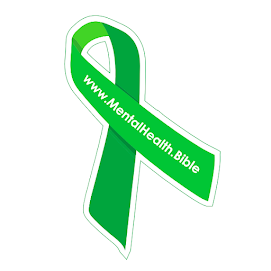Biblical Help and Hope for People with Mental Illness: Idea #38
Every one of us probably knows someone that struggles with mental illness, as these startling statistics from Kay Warren’s article, “ Hope for Mental Illness” (Huffington Post, August 2015) illustrates—
Sixty million Americans - that’s one in five adults - will experience a mental illness in the coming year. That means every one of us knows someone who is living with a mental illness - depression, anxiety, schizophrenia, an eating disorder, bipolar disorder, borderline personality disorder and some additionally have a substance abuse.
- Half of all adults will suffer from mental illness in their lifetime.
- Half of all chronic mental illness begins by the age of 14.
- One in five children will have a mental illness by age 18.
- Ninety percent of people who die by suicide also had mental illness.

How the Bible Gives Hope for Mental Health
The Bible offers hope and help for people that struggle, as expressed in these top 5 Bible verses about mental illness (via openbible.info)—
When the righteous cry for help, the Lord hears and delivers them out of all their troubles. The Lord is near to the brokenhearted and saves the crushed in spirit. Many are the afflictions of the righteous, but the Lord delivers him out of them all. He keeps all his bones; not one of them is broken. (Psalm 34:17-20)
Do not be anxious about anything, but in everything by prayer and supplication with thanksgiving let your requests be made known to God. And the peace of God, which surpasses all understanding, will guard your hearts and your minds in Christ Jesus. (Philippians 4:6-7)
So his fame spread throughout all Syria, and they brought him all the sick, those afflicted with various diseases and pains, those oppressed by demons, epileptics, and paralytics, and he healed them. (Matthew 4:24)
For God gave us a spirit not of fear but of power and love and self-control. (2 Timothy 1:7)
Fear not, for I am with you; be not dismayed, for I am your God; I will strengthen you, I will help you, I will uphold you with my righteous right hand. (Isaiah 41:10)
And the Bible has inspired believers and churches to care for people, for their health and well-being: spiritually, physically, emotionally, and mentally. Tommy Hilliker (Saddleback Church’s pastor of ministry) describes it this way: “ We care about the whole family, and we want to care about them for their whole lifetime. We want to minister to the physical, spiritual, emotional, relational and mental needs of a person because Jesus did.”
3 Reasons Churches Must Help
Here are 3 compelling reasons for why the church must help people who struggle with mental illness, as explained in this March 2014 TIME Magazine article, Rick Warren: Churches Must Do More to Address Mental Illness (or watch this video of Why The Church Should Care About Mental Illness with Pastor Rick Warren)—
There are biblical, historical, and practical reasons that churches must be at the table with this issue.
First, from the Gospels, we know that Jesus cared for and ministered to mentally ill people during his ministry on earth. As Christ followers, we are compelled to continue His work today. In Christ’s name, the Church extends compassion, acceptance, and unconditional love to all who suffer from the pain of mental illness, and as his Body, we offer hope and the healing power of God’s grace.
Second, the church has been caring for the sick, both physically and mentally for 2,000 years longer than any government or agency. Most people are unaware that it was the Church that invented the idea of hospitals. For centuries the Church has been a refuge for the outcast, those on the margins, and anyone enduring societal stigma and shame.
Finally, studies have shown that when families or individuals experience the chaos caused by mental illness, the first place they typically call in a crisis is not a doctor, a law office, the school, or the police, but rather they call or go see their priest or pastor. Anyone who’s served as a receptionist for a church knows that they often are required to do triage in mental illness cases. Why is that? Because people instinctively know that churches are called by God to be places of refuge, comfort, guidance, and practical help for those who suffer.
Sharing the Truth about Mental Illness in Faith Communities
Recently, on October 8th and 9th, Saddleback Church in Lake Forest, California, hosted its 2nd Gathering on Mental Health and the Church, with more than 2,200 people attending and nearly 4,000 people watching the conference online (hope4mentalhealth.com). This conference and website provides many of the most valuable resources for churches and Christians to care lovingly and biblically for people’s mental health.
These kind of conferences are few and the needs are great, as shown in this article, “ Rick And Kay Warren Launch Saddleback Church Mental Health Ministry After Son’s Suicide” (Huffington Post, March 2014)—
Still, the situation is especially dire among evangelicals, said Warren. Survey results from the Southern Baptist-affiliated nonprofit Lifeway Research, released in September, found that close to half of evangelical, fundamentalist and born-again Christians believe prayer and Bible study alone can solve mental illness.
Frank Viola explained how different Christians have different understandings about mental illness, in “ 3 Christian Responses to Mental Illness; Which One Is Most Biblical?” (Christian Post, April 2013)—
Throughout my years of being involved in various and sundry Christian movements and denominations, it seems that Christians understand mental disorders in one of three chief ways:
1. Mental illness is demonic in origin. So the antidote is to cast out the demons that are causing it.
2. Mental illness is psychobabble. There’s no such thing as a “mental disorder.” All so-called mental illnesses are just sinful behaviors. So the antidote is for person to repent and get right with God.
3. Mental illness is a physiological disorder. The brain is a physical organ just like the heart, the thyroid, the joints, etc. Thus if someone has panic attacks or bipolar disorder or schizophrenia or chronic depression or ADHD, they have a chemical imbalance in the brain, not dissimilar to a hyperthyroidism or high blood pressure or arthritis.
I cut my teeth on a movement that promoted #1. I’ve met many people who believed #2. But I believe #3 is often the case.
Yet it’s not so simple.
The problem, I feel, is that confusion over this issue seems to be rooted in the fact we don’t properly understand the integration of body, soul, and spirit.
How will the Bible motivate, inspire, and strengthen you to help people that struggle with mental illness? Absolutely, God is the ultimate healer and Great Physician, and God does use His people and His Word to be the agents of healing too.
How can you help?
What do you think? Are you inspired and moved by the Spirit to develop a website or app that'd help people experience more of what the Bible has to say about mental health and mental illness?
MentalHealth.Bible—Free Resources about Mental Health
In September 2019, the .BIBLE team launched a new website at MentalHealth.Bible to serve the public with a curated collection of mental health resources that are especially useful for churches, clergy, pastors, Christians, and others for whom faith is a key component of their lived experience. Share the memorable URL MentalHealth.Bible with others. We hope these resources will be helpful to many.
This article is part of the blog series, 66 Ideas for .BIBLE Domain Names, with practical ideas for using .BIBLE domain names. Individuals and organizations can now register .BIBLE domain names that are more shareable, memorable, and meaningful at any accredited registrar.


